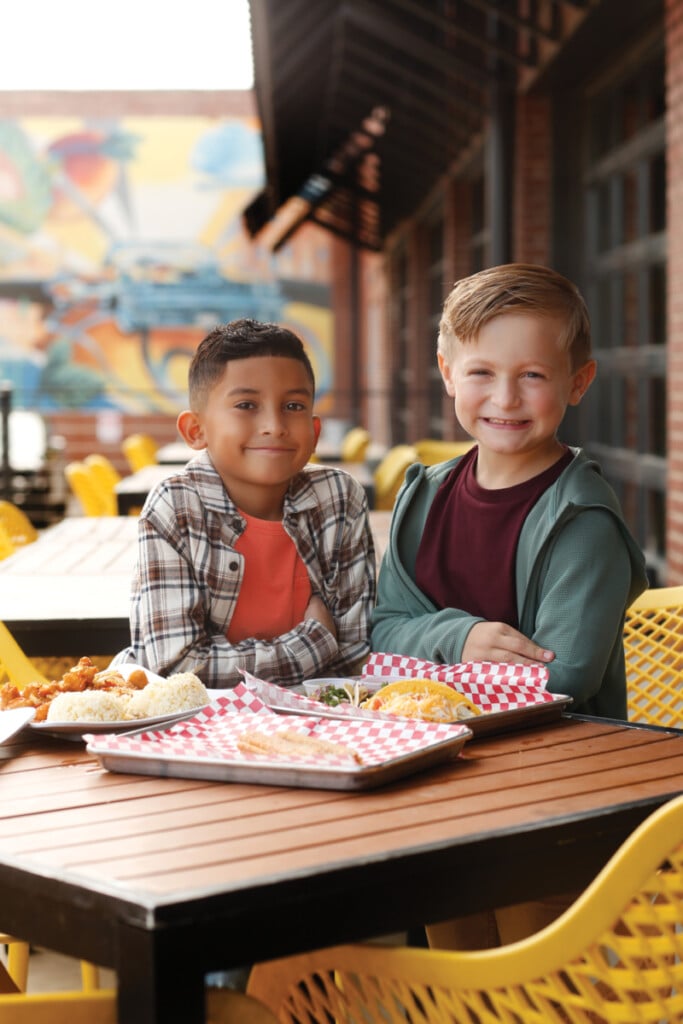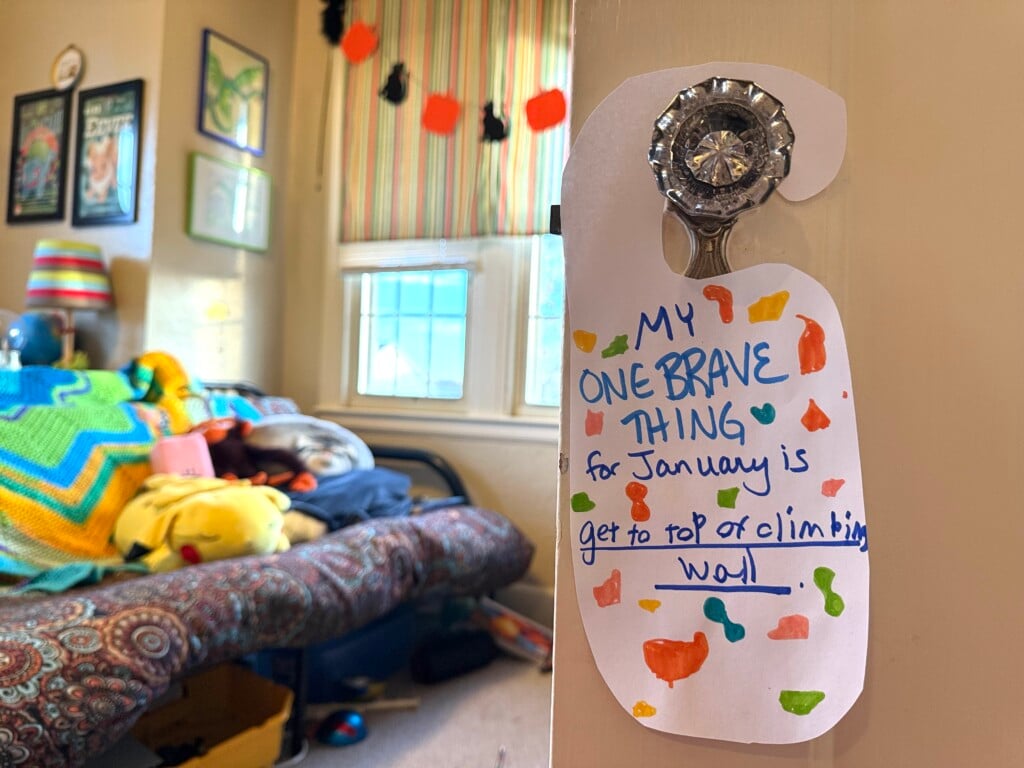Dig In! Using Food and Fellowship to Learn about Other Cultures

For many Tulsa families, fall and winter not only means gathering with loved ones and friends to celebrate and enjoy delicious meals together, they’re also an ideal time to embrace individual heritages, share cultural traditions and introduce younger generations to new cuisines.
Modern celebratory meals and the sharing of cultural traditions harken back to ancient festivities, including what is believed by some historians to be the first Thanksgiving celebration in 1621. President George Washington declared Thursday, Nov. 26 a day of public thanksgiving “for the People of the United States.”
However, many Native Americans and others see Thanksgiving as a day of mourning for the taking of lives and land rather than one of celebration and giving thanks.
Perhaps viewing Thanksgiving as a day for openness and cultural understanding could provide an opportunity to learn more about others, using food as a catalyst.
The Benefits of Trying Different Cuisines
For many families, trying new cuisines or sharing their culture with others through cooking allows younger generations to broaden their view of the world and develop a taste for foods different than those they are used to at home.
“The experience of sharing food is a very personal thing,” said Lesley Bumgarner, director of congregational life at Temple Israel in Tulsa. “It’s a good way to get to know people when you break bread.”
The benefits of sharing meals are wide ranging for children, according to the American Academy of Pediatrics. Those benefits include more healthful dietary patterns, better academic performance, improved social skills and less fussiness when it comes to trying new foods.
Bumgarner, a mother of three who has a master’s degree in elementary education and is a former teacher, said trying foods from different ethnic or cultural backgrounds is a great learning opportunity for children and can help them appreciate differences with others.
“Educationally, more information and exposure is always a good thing for kids,” she said of introducing them to new cultures and cuisines. “It helps them expand their view of the world to see how other people, families and kids eat differently and think differently.”
Before becoming a parent, Bumgarner spent a year living in France and said the experience not only made her a more adventurous eater, but also carried over to her children. Having experienced life in a different country helped shape her own approach to cooking and encouraging her children to try new things.
“Moms in France introduce their kids to different foods at a young age,” she said. “The kids are better for it, and they’re not hesitant to try new things.”
Passing Down Traditions
Now grown, Bumgarner’s children were exposed to many different cuisines during their childhood. Travel, celebrating holidays with special foods and assisting in the preparation of family meals all helped to expand their palates and their understanding of different cultures.
“My kids grew up eating all sorts of things – everything from escargot to boeuf bourguignon,” Bumgarner said, adding that encouraging her kids to help in the kitchen and passing down family recipes from previous generations also helped pique their interest in trying different dishes.
“Judaism is a very home-based religion, and Jewish kids are raised with cooking at home,” she said, noting that she keeps a treasured collection of her grandmother’s handwritten recipes, which she still uses for family meals and celebrations.
“Kids are more likely to taste and try foods they’ve been involved in preparing,” she said. “They will see the love and care that goes into those foods and have some pride in that.”
Tulsan Gina Michalopulos Kingsley, a former educator and psychometrist, grew up in a Greek-American household and said 90 percent of what she ate as a child was Greek food. Her family traditions and recipes also have been passed down to her three sons, who she said joined her in the kitchen from a young age and learned how to cook and develop an appreciation for their heritage.
“We raised them totally immersed in the Greek culture,” she said.
Grocery Shopping Adventure
Kingsley said having kids help shop for ingredients at the supermarket is a great way to get them excited about trying new foods, as well as being a learning experience.
Helping shop for a meal gives kids an opportunity to practice reading and other skills such as learning measurements and fractions, she said, adding that making the process fun is key.
“We would split the grocery list and make it into a game,” she said of her sons when they were younger. “Everyone had to find their items and race to meet back at the register.”
Cultural Festivals
Local festivals also are a fantastic way to get kids to try new foods and learn about other cultures that they might not otherwise experience on a regular basis. Throughout the year, Tulsa is home to a multitude of ethnic festivals ranging from Tulsa City-County Library’s annual Asian American Festival and Tulsa German-American Society’s GermanFest in May to the Tulsa Greek Festival, Festival Americas and Scotfest in the fall.
Each celebration offers traditional music, activities and lots of great food, but also the chance for Tulsans to celebrate their heritage and introduce it to others from different backgrounds.
“We have made such an effort to promote our culture in Tulsa,” said Kingsley, who is active in the local Greek-American community and notes the overwhelmingly positive response to the annual Greek Festival, where visitors can find yummy, kid-friendly treats such as loukoumades (Greek honey puffs) and Greek fries (potatoes with Greek seasonings, feta and tzatziki).
“People have always been very supportive of our culture.”
For more ideas on introducing kids to new cuisines and cultures, check out foodbycountry.com, which features tasty recipes for traditional ethnic foods, along with information about dining customs and the history of cooking in each country.
This recipe for honey cake, a sweet treat often served during the celebration of the Jewish New Year, Rosh Hashanah, comes from the Temple Sisterhood at Temple Israel in Tulsa and would make a delicious accompaniment to any holiday meal or celebration. It can be baked in a regular loaf pan or specialty pans, such as Nordic Ware beehive cakelet pans.
Peg’s Beehive Honey Cakes
- 1 1/4 cups all-purpose flour
- 1/2 teaspoon baking soda
- 1 teaspoon baking powder
- 1/4 teaspoon salt
- 3/4 teaspoon ground cinnamon
- 1/4 teaspoon cloves
- 2 large eggs
- 1/2 cup granulated sugar
- 1/2 cup honey
- 1/3 cup canola oil
- 1/2 cup tea (mix 1/2 cup hot water with one tea bag – chai or spicy flavor preferred)
- 1/2 teaspoon vanilla extract
- Additional mixed granulated sugar and cinnamon mixture for sprinkling on top of cake.
Directions
- Preheat oven to 340 degrees F.
- Grease or spray a 9-by-5-inch loaf pan or specialty pan. You will need to adjust baking time for the specialty pan, so watch carefully.
- In a large bowl, sift together flour, baking soda, baking powder, salt, cinnamon and cloves. Set aside.
- In another large bowl, beat together eggs, sugar and honey until light and fluffy, 2-3 minutes. On low speed, mix in oil and vanilla.
- Beat in the flour mixture in three additions, alternating with tea in two additions, starting and ending with the flour. Do not over mix.
- Pour batter into prepared pan. Bake for 35-45 minutes (for smaller specialty pan) or until toothpick inserted into center of cake comes out clean.
- Allow cake to cool for 10 minutes, then remove from pan. Drizzle with honey and sprinkle with cinnamon sugar.
- Store cake in airtight container for up to four days or freeze until ready to thaw/serve.
Tastes of Tulsa
Whether it’s fresenjoon, a classic pastrami on rye, authentic French pastries or a plateful of made-from-scratch polenta, Tulsa’s restaurant scene offers a vibrant, mouthwatering array of options perfect for introducing children to new tastes and cultures. Here’s a sample of the many delicious offerings available in Tulsa and surrounding communities:
- Basque Tulsa, 114 N. Boston Ave., 918.442.2996
- Desi Wok, 3966 S. Hudson Ave., 918.621.6565
- Elote Cafe & Catering, 514 S. Boston Ave., 918.582.1403
- El Rio Verde, 38 N. Trenton Ave., 918.592.2555
- French Hen, 319 E. Archer St., 918.492.2596
- Freya Nordic Kitchen, 3410 S. Peoria Ave., Suite 200, 918.779.4413
- Gambill’s Jewish Deli, 1102 S. Lewis Ave.
- Gigi’s Chinese Cuisine and Sushi Bar, 7105 S. Yale Ave., 918.992.5822
- India Palace, 6963 S. Lewis Ave., 918.492.8040
- Kai Vietnamese Cuisine, 201 W. 5th St., 918.582.0200
- Lalibela Ethiopian Restaurant, 312 S. Elm Place, Broken Arrow, 918.455.0057
- Margaret’s German Restaurant, 5107 S. Sheridan Road, 918.622.3747
- Mondo’s Italian Ristorante, 3534 S. Peoria Ave., 918.561.6300
- Nola’s, 1334 E. 15th St., 918.779.7776
- Pancho Anaya Bakery, 2420 E. Admiral Blvd., 918.561.6735
- Prossimo Ristorante, 1550 E. 15th St., 918.271.5096
- Rendang & Co., 5083 E. 51st St.
- Saffron Mediterranean Cuisine, 3313 E. 32nd Place, 539.525.0503
- Saint Amon Baking Company, 8156 S. Lewis Ave., Suite E, 918. 364.2143
- Shawkat’s Mediterranean Grill, 4123 S. Sheridan Road, 918.742.7023
- Siegi’s Sausage Factory, 8104 S. Sheridan Road, 918.492.8988
- White Lion Pub, 6927 S. Canton Ave., 918.491.6533




